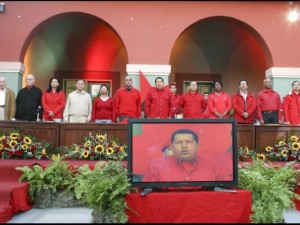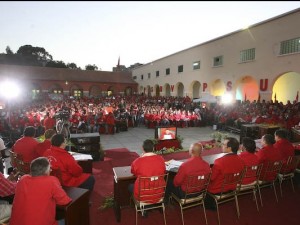Chavez Inaugurates Founding Congress of New Socialist Party of Venezuela
- 15 January 2008
Referring to the recent defeat of his proposed constitutional reform proposal, Chavez argued that it was necessary to go on the offensive with the "United Socialist Party of Venezuela as the spearhead and vanguard" of the revolution, "In order that December 2nd never happens again."
 |
| Coordinators of the founding congress of the United Socialist Party of Venezuela (Francisco Batista/RNV) |
Speaking to the 1,676 delegates and invited guests from more than 20 countries, Chavez stressed that the formation of the PSUV was necessary to push forward the Bolivarian process. A revolution "cannot depend on one person or an elite, rather it must be based in the people," he said.
In order to guarantee the continuation of the revolution, the PSUV had to become a party that would subvert the historic capitalist model of the bourgeois state, Chavez said.
It is also necessary for the PSUV to carry out a struggle to avoid the rise of a "new Bolivarian oligarchy," of a new bourgeoisie, he warned, because these groups could easily convert themselves into traitors and counterrevolutionaries. It is therefore important to combat any infiltration by the bourgeoisie in the PSUV, he added.
Chavez also argued that the PSUV needs to link up with the trade unions and social movements and that the social movements needed to transform themselves into a political force capable of driving forward the revolution.
Referring to Mission Ribas, which has organized some 500,000 previously excluded Venezuelans into secondary education, Chavez stated, "This is a social movement which at the same time should form itself as a political force, as should the unions and other organizations".
This transformational political force, said Chavez, requires a united and coherent leadership in order to propel the movement towards its goal, whilst tackling the issues of lack of cohesion and internal disorder between the pro-Bolivarian revolution parties that threatened the continuity of the revolution.
Chavez reiterated his recent call for the formation of a Patriotic Alliance of all forces that support the Bolivarian revolution and withdrew his public criticism of the Communist Party of Venezuela (PCV) and Homeland for All (PPT) for not dissolving to join the PSUV. "Many of their leaders were tortured here in this prison" under previous governments of the Fourth Republic Chavez commented.
 Understanding the real history of the country and the rise of
revolutionary processes was important argued Chavez, recalling that
2008 marked 100 years of US domination over Venezuela, when US
intervention resulted in the overthrow of then president Cipriano
Castro and ended the Liberal Restoration Revolution he had led.
Understanding the real history of the country and the rise of
revolutionary processes was important argued Chavez, recalling that
2008 marked 100 years of US domination over Venezuela, when US
intervention resulted in the overthrow of then president Cipriano
Castro and ended the Liberal Restoration Revolution he had led.As part of learning about history, revolutionary processes, and the training of cadres, he announced that a printing press for the PSUV would be shortly inaugurated to publish books and ideological texts. The PSUV will be "a school to transform and create the new historic bloc and construct socialism in all its ambits." To fund this, an account would be set up for PSUV militants to deposit money Chavez said.
The promoter commission of the PSUV, which has been converted into a technical commission of support, in order to organize and facilitate the founding congress, also distributed two documents, one of 24 pages and the other of around 40 pages, which outlined draft proposals for the program, principles, statutes, and structure of the party.
Some of the draft proposals include; the election every two years of a National Committee of 281 members and the formation of a Committee of Disciplinary Ethics, composed of 7 members, who would be elected by the National Committee.
Over a six week period in April to May 2007, a massive 5.7 million Venezuelans registered to become members of the new party. This was followed by a process of convoking grass roots assemblies or "socialist battalions" to discuss issues such as the political program and statutes of the PSUV as well as general education on socialism and Chavez's project of constitutional reform.
On September 29 a total of 14,368 spokespeople from each socialist battalion were elected, with spokespeople from every 7-10 battalions forming a socialist circumscription, which in turn each elected one delegate to the founding congress.
The congress is scheduled to last for two months to allow time for delegates to report back to the socialist circumscriptions and socialist battalions. The PSUV will then elect candidates for the upcoming elections for mayors and governors in October.

 Please help build the campaign by
Please help build the campaign by